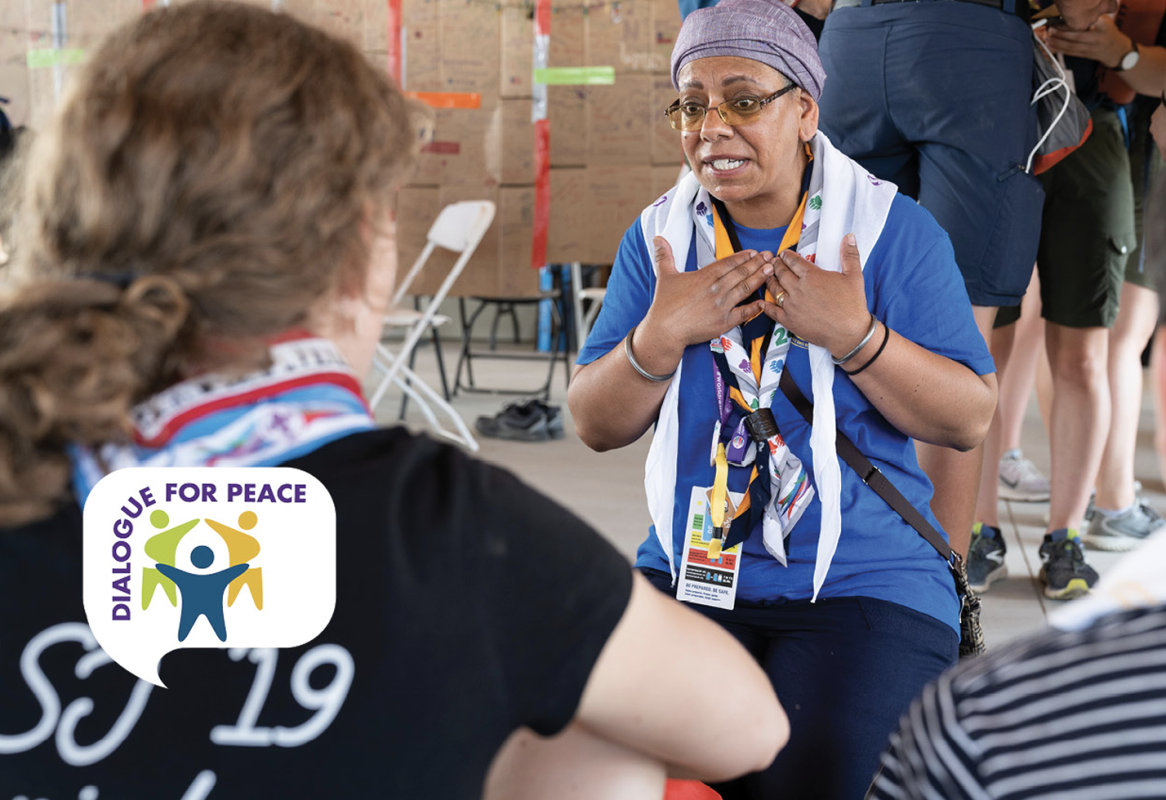Explore what we mean to be a Dialogical Scout and feel empowered to define who you are, in a dialogical way.
What will you learn?
This activity works towards the LISTENING and ACKNOWLEDGING requirements for the Dialogue for Peace Challenge.
Materials Needed
- 10 Principles of Dialogue PDF (link)
- Flip chart
- Pens
Activity Instructions
Note: This activity is best undertaken after the 10 Principles of Dialogue and/or Dialogue Puzzle activities.
- Explain what we mean by Dialogue. What it is and what it is not. For this, refer to the D4P Manual, pg 22.
- Dialogue every day – explain that meaningful and constructive dialogue is offered to us each time we interact with others either in a direct exchange or as part of a collective activity. The ideal scenario would be for this to become a relevant and positive experience between two or more people.
- Ask the young people: Can you think of times this may take place in your scouting life? Give them 5 minutes in small groups (3-5 in each group)
- Ask each group to present back their examples. Some help for facilitators below:
- With Peers, during a spontaneous or planned conversation between two or more scouts.
- When the pack/patrol/team gathers to discuss a topic, plan activities or share experiences.
- Between Scouts and Scout Leaders while discussing personal progression, personal issues or just having a conversation about a particular activity or topic.
- Within collaborative teams in our Scout Group, institutional bodies.
- During international exchanges online or face to face, or when people gather like during Jamborees, Conferences, etc.
- During the locally organized activities executed in our programmes.
- Permanently with ourselves before, during and after activities.
- Recap or introduce the 10 Principles of Dialogue.
- Divide the participants into small groups (3-5 in each group).
- Give each group a flipchart and coloured pens.
- Ask each of the teams to let one of the participants lay on a big sheet of paper, draw his/her silhouette, and ask the participants to write or draw on the silhouette the skills, attitudes and values that a dialogue facilitator should have.
- If you are having this activity virtually you can ask the group to use a whiteboard in a shared place and draw as a team.
- You can provide playful tools that participants and use for more fun drawing and writing.
- Ask each group to hang their picture on a wall and then individuals walk around and look at the other drawings, we usually encourage this in silence to encourage reflection. If you are having this activity virtually you can ask each group to present their drawing or ask the participants to mention what they see in the other's drawing.
- Invite a Group reflection, to debrief as a whole group. See the suggested questions below.
- Discussion on how a dialogical scout behaves based on listening, acknowledging, responding and taking action. Ask for examples on each area of the learning journey; Listen, Acknowledge, Respond and Take action. What might some of those things look like?
A dialogical scout can be defined as Someone who has integrated the dialogue principles into his/her daily practice and is permanently fostering an attitude of curiosity and understanding of what is behind the words, behaviour or attitude of others.
Debriefing and Reflection
Please refer to the Learning Objectives above for each age group when explaining, facilitating, and recapping this activity. Select the questions relevant to the age group and their objectives.
Making efforts means that Scouts need to activate and become aware of our already incorporated skills and combine them with the dialogue principles in a conscious way. We need to practise dialogue actively and inspire others to do so. We should make efforts to intentionally engage with those who are different.
- Are you a Dialogical Scout?
- What thing do you need to improve to become a dialogical scout?
- How does dialogue fit in your everyday life, outside of scouting?
- What might you start doing or do differently following this activity?
As the adult leader, you should also encourage other reflection and questions based on your knowledge, experience and desired objectives
Time needed
Contains
- Offline content
Age range
- 7 to 10
- 11 to 14
- 15 and above
Useful links
Challenges
SDGs
Time needed
Contains
- Offline content
Age range
- 7 to 10
- 11 to 14
- 15 and above
